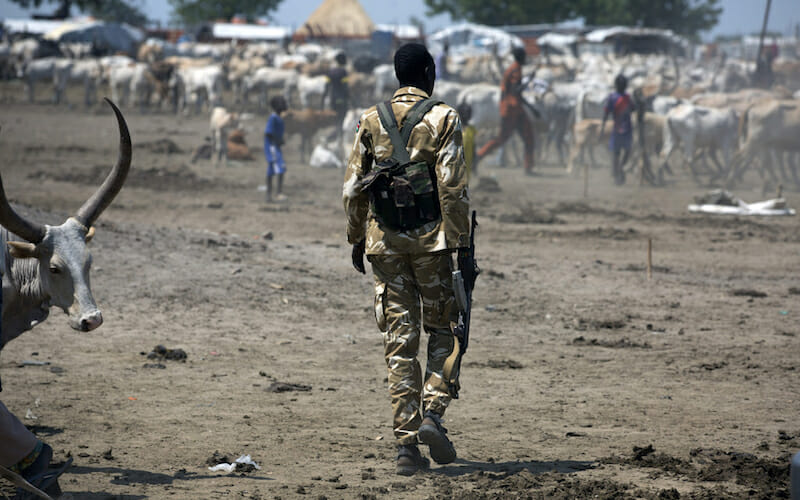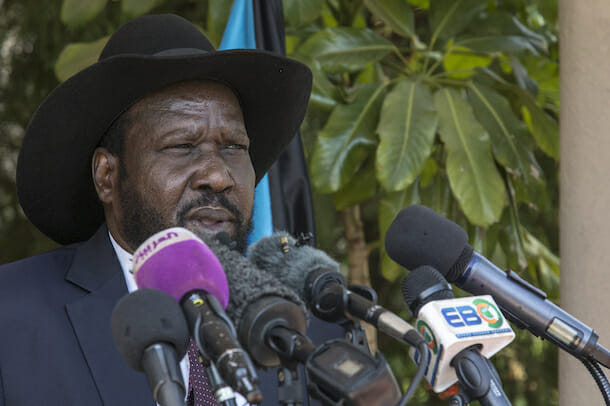
Nikki Haley’s South Sudan Plan
A face to face meeting between the President of South Sudan, Salva Kiir, and opposition leader in absentia, Riek Machar, is set to happen before the 31st Summit of the Assembly of the African Union convenes in July, following mediation by Kenyan 2017 presidential runner-up, Raila Odinga. This rather impressive result is a last-ditch effort to force peace and materialized only after cajoling by states as well as by international and interregional institutions. It remains to be seen whether or not this is just another false cure for the fighting. Kiir may actually intend to merely placate international pressures, although Machar hopes to surf these pressures back into the executive offices in Juba. Should the talks fail, the US’ language may sound more like its language on the Middle East and Latin America.
South Sudan remains fractured along ethnic and political lines, and Kiir and Machar have regrettably become avatars of “reconciliatory” ambitions. It is currently one of the most dangerous places to work for internationals. A nonprofit I work with recently had an executive rescind acceptance of a position after learning that we wanted him to travel to the country to get a first-person feel for things. What little money might go to development has been subverted and obscured. There remains a representational imbalance. Kiir, in particular, has become increasingly unhinged of late. He’s reportedly slain journalists and has consolidated power. Years of reports of coups and assassination plots have redoubled his paranoia.
In a lachrymose editorial for the Washington Post, US Ambassador to the UN, Nikki Hailey, recommended sanctions against the leadership of South Sudan, speaking of her own “impatience” and “anger” over the conflict, which has forced more than a million refugees to flee. Like the threat to stop assistance funding, Ambassador Hailey’s comments were supposed to press the efforts to defibrillate the peace talks, which had previously and heartbreakingly flat-lined, in Ethiopia. However, this move may have also served a double purpose: building the case for intervention and serving the more local interests of the US ambassador. Regardless of intent, the administration has opened the way for a regime change option in this chaotic stretch of East Africa.
Of course, the regime change agenda in South Sudan wouldn’t be the only (or the first time) that the Trump administration has advocated for such action. Indeed, it seems as though the administration wants to exchange leaders across the Middle East, like unwanted Christmas sweaters. This may illuminate some of the objectives or methods of the administration in East Africa. As Stephen Walt argues effectively in Foreign Policy Magazine, the Trump obliteration of the Iran nuclear deal will likely prefigure the push for a series of regime changes in the Middle East. This is hardly surprising, given the appointment of uber-hawks and governmental clunkers like Mike Pompeo and John Bolton, with Bolton even defending the Mujahedeen-e-Khalq, the creepy former terror watch list group that is plotting the overthrow of the Iranian government. Indeed, in this instance sanctions may be a primary weapon for causing regime collapse, which one would not recommend as a technique for peacemaking in East Africa since sanctions have failed to achieve their goals in both North Korea and Cuba.

I can attest firsthand that there’s a culture of violence in South Sudan that views the wild years of the war with the North as sacred. That they openly and officially refer to the dead of that war as “martyrs” is but one example. The current fighting draws its lineage from the cultish and largely ethnic ties founded in that fight. Ironically, it was the North that used Riek Machar to attempt to subvert that very struggle for independence, the struggle that led to the promise frustrated by the incompetence and corruption of the South Sudanese government, which is presumably what Ambassador Hailey is referring to when she says that the regional government failed South Sudan and that the US “must not.” It should be stated, also, that Khartoum seems to have continued supporting the ethnic-based militias terrorizing the South. There is slavish insistence on reinstituting Riek Machar and making him an ethnic representative, since he was one already. But that is not to mitigate the train wreck that Kiir has created.
Despite the many crimes of the South Sudanese government, the country has also been a victim of the wandering eye of US foreign policy, and that should not be mistaken for American “patience.” That frame job, to recycle a moth-eaten phrase, is more suspicious than accurate. Was it overdue impatience that animated the threat to pull assistance funding to South Sudan, or was it the general desire of the administration to revisit international funding for a more favorable “balance-sheet,” as the administration has previously suggested? From the regional perspective, Hailey’s insistence on the ignorant North-South narrative keeps old wounds raw. It antagonizes reconciliation efforts and indeed may encourage rebellion among minority groups that might (falsely) think the US is on their side. As for incentives, this leaves the Dinka ethnic group with the open option of refusing to cooperate with minority ethnic groups. This is the very tactic that the US is constantly accused of having performed across the globe, making a caricature out of all parties involved. It also undoes the hard-won gains of the Bush administration, by keeping the country in a perpetual state of ethnic conflict. In other words, a regime change strategy would prolong the civil war and rebellion efforts at the expense of the entire Great Lakes Region of Africa. My concern is Ambassador Hailey’s track record.
Another suggestion may explain Hailey’s interest in the country. The political ambitions of Ambassador Hailey– who served as governor of South Carolina until 2017– have been lifted by her service in this hawkish administration. Her blushing “impatience” with the atrocities in South Sudan could set her up for further political positioning. This was much the cynical way Hilary Clinton used the poor of Haiti and the dictatorship in Libya to establish her foreign policy experience for her presidential run. Put tersely, the strategy is this: go hard after some thug in an African state, showing that you can have teeth when necessary, expose your softer side with a perfunctory aid attempt, showing you can be tender when the moment requires, then bill it all as “foreign policy experience.” It allows her to separate from the pack while remaining very much a member, like a ravenous wolf in a lambskin jacket.
Like Clinton, Hailey seems to believe in regime change as a strategy. She has labeled regime change in Syria as “inevitable” and has even prescribed it as an antidote to Maduro in Venezuela. These dogs of war may not have slipped their leash, but Ambassador Hailey seems to be choking on hers. Incidentally, there’s an unsatisfying irony in a Republican who was considered for Mitt Romney’s running mate in 2012 demanding a weapons ban and using the image of suffering children to do it.
It’s hard to see how this won’t end either in the usual insouciance or an open call for regime change from the Americans. Unless we’re prepared to consider a two-state solution, so to speak, for the warring factions of the South, which would leave the country fractured and starving along ethnic lines, then reconciliation is not really negotiable.
If the ambassador only now found out about the atrocities in South Sudan, I won’t blame her, but her impatience for genocidal abuses is not a reason to accelerate violence by forcing regime change. It would merely swap out one corrupt and tribal faction for another.

